 The History Boys and The Colbert Report have one thing in common. Both of them understand that postmodernism has been coopted by the right. The academic doctrines that called for cultural relativity, no such thing as right and wrong, the validity of all opinions no matter how unsubstantiated -- these arguments, once embraced by hippie professors, have been coopted and abused by people with power. Intelligent design is as valid as Darwinism, and Saddam had links to Al Qaeda: nothing can be disproved if all that matters is opinion.
The History Boys and The Colbert Report have one thing in common. Both of them understand that postmodernism has been coopted by the right. The academic doctrines that called for cultural relativity, no such thing as right and wrong, the validity of all opinions no matter how unsubstantiated -- these arguments, once embraced by hippie professors, have been coopted and abused by people with power. Intelligent design is as valid as Darwinism, and Saddam had links to Al Qaeda: nothing can be disproved if all that matters is opinion.That's truthiness.
The History Boys starts with an unidentified, wheelchair-bound official in the British government talking about the need to persuade people to cede their rights in order to be free.
Cut to the 1980s, to a class at an English boys' school taught by an obese, opinionated teacher named Hector.
His students are the top boys, bound for Cambridge and Oxford, able to quote Auden from memory and speak fluent French. Hector believes in knowledge for the sake of pure knowledge. He sounded like a lot of the professors I had in college, whose ideal of education was based on the principle that knowing great books and understanding history would enrich your life.
But there are college entrance exams and institutional reputations. The school's headmaster hires a recent, polished Oxford grad named Irwin. Irwin doesn't care if the students' answers are logical, so long as they're unconventional. The students, at first resistant, gradually become intoxicated by his personality and his unconventional ideas. Irwin is too young to be as cynical as he is, to take as much pleasure as he does in belittling the unoriginality of teenagers. He regrets his life, and on some level envies theirs. At heart, he is a careerist: the point of his students' education is to get them into Oxford or Cambridge.
Hector, by contrast, says that there's no point to entering Oxford and Cambridge. Someday, the boys will graduate, and when the whole goal of life is entering one of the top schools, as soon as they leave they'll have nothing left.
The History Boys has a lot of big ideas -- about how to think about history, about what it means to have an education, and about how teachers' inner lives can disrupt the lives of their students.
Ultimately, it was powerful and persuasive, but it had a cumulative effect. At certain points, the classroom antics of the play's precocious students seemed lifted from Head of the Class. Often, the boys were not convincingly written. If I remember correctly, playwright Alan Bennett is about five decades removed from being a teenager, and it showed. I occasionally wondered why the show was so acclaimed.
There was another problem: The play's portrayal of its characters' sexualities -- particularly Dakin, the central student character -- was not credible. Irwin's status is ambiguous. We learn from the beginning start that Hector has a habit of fondling favored students while giving them lifts home on the motorcycle; his students react to this with a tolerant weariness, including the womanizer and the devout Christian. One of the students, Posner, is forthrightly gay, and tortured by his attraction to Dakin. Dakin, who is sleeping with the headmaster's secretary, is disgusted by Posner's attention, yet content to manipulate it for his own amusement. Much of this behavior seemed far-removed from real life.
I'm not a theater guy. I go to about two performance a year, usually one Shakespeare and one drama. I bought the tickets in April on the morning that I read a rave review in the Times. It was a coincidence that I went the week it won six Tony Awards, including Best Play. I'm a big sucker about history and academic politics, so I thought it would be a good fit.
Ultimately, I guess, it was. There were a lot of bells and whistles that I didn't buy, and a few points where I rolled my eyes. Yet by the end, I loved many of the characters, and was fundamentally moved by their fates. I don't think the play understands adolescence, but to its credit, it fully understands education. I thought about all of the great history professors that I had in college, where I hung on every word and had afternoons when it felt like my brain was on fire. Hector would be happy to know that I still think about those teachers all the time.

No comments:
Post a Comment